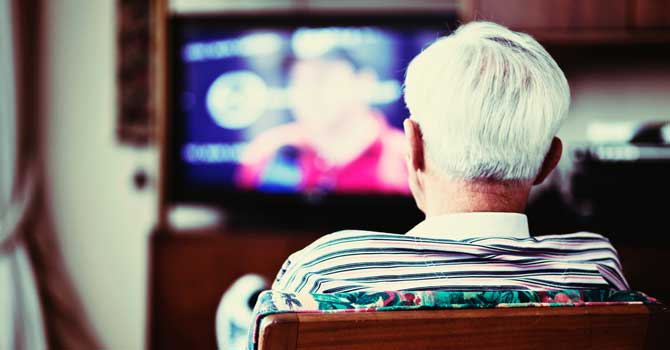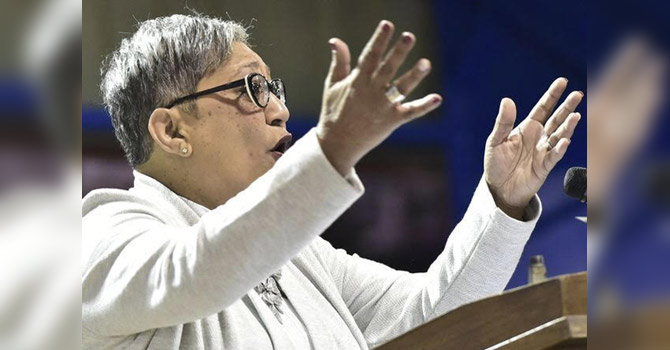Thirty years ago, I saw a bumper sticker that said, “God, Guns and Guts: What Made America.” These days, it’s going to take pastoral guts to deal with the issue of guns in America.
I recently visited a retired man on the fringes of our church at the request of his wife. While she is involved and active in retirement, he tends to stay at home, piddling and watching TV all day.
When I arrived, he invited me in and offered me a glass of iced tea, and we sat down to talk.
“Gary, do you mind if we turn the TV down?” I shouted.
“Sorry,” he said, “I watch it during the day with no one else around and forget how loud it is.”
I saw that it was on Fox News, something I’d noticed was becoming the norm in my visits with shut-ins and my sojourns in hospital waiting rooms, doctors’ offices, car repair waiting rooms, barber shops, restaurants, airports and the like.
So I asked, “Gary, do you watch a lot of Fox News?”
He said, “No, no. Sometimes I watch The Weather Channel.”
This was while Hurricane Harvey was heading toward Houston and The Weather Channel was reporting everything in all caps, with exclamation points at the ends of all the sentences.
“Let me ask you something. Does watching Fox and The Weather Channel bother you? I’m wondering because watching this stuff around the clock would drive me crazy,” I said.
He agreed with me that his anxiety was high but suggested that the TV was helping, keeping him “informed and ready.”
“Ready for what?” I asked.
He walked over and lifted a newspaper from the lamp table next to his recliner. Under it was an automatic pistol. “Looters and anybody else who comes along threatening us. I’m ready to protect our home.”
This is not a normal conversation I have with my church members. But it comes up with occasional attendees and first-time visitors. It’s something I’m learning to pay attention to, because it reflects conversations out in the wider community.
The old Baptist civil rights activist Will Campbell had a country church preacher tell him, “There’s a lot more to this race thing than just segregation.” Well, there’s a lot more to this gun thing than just the Second Amendment or rights or even hunting.
I’m convinced, after 40 years of being a pastor, that guns are a theological issue -- that guns are a primary way we are drawn into the pervasive power of death.
By death I do not refer simply to the ending of the biological and physical processes of our bodies, though that’s part of it. I mean death as a living reality that diminishes, disintegrates, isolates, separates, exploits and destroys God’s good creation and creatures.
Theologian William Stringfellow called death a moral reality that is to be comprehended in all its complexity -- “sociologically and anthropologically, psychologically and psychically, economically and politically, societally and institutionally.”
“Death as a moral power,” he said, “means death as social purpose.”
Death seeks to dominate our lives and our world -- and guns are an entry point to death.
It was not always this way, or at least it was not as blatant and overt as it is now. I grew up around guns in my small West Texas town and often used them when bird hunting with my father and grandfather, my brother, and sometimes my uncle.
But the rest of the time, the shotguns were put away in closets, and we didn’t pay any more attention to them than we did to the hammers and saws we got out when doing carpentry.
Now, though, for me as a pastor to raise a question about why someone carries a firearm on his belt while professing to be a baptized follower of Jesus Christ is to invite outright, in-your-face hostility. It provokes defensiveness that far exceeds expectations. One of the rare times I’ve been screamed at was after I said something in a sermon against guns.
A pastor friend of mine down the road had to resign his church last year because, over his pleading not to do it, the congregation voted to arm the ushers and install panic buttons throughout the building in case anyone saw a stranger who looked threatening. Many pastors I know have been told by key church members -- off the record -- to not even bring up the subject.
So what do we pastors do?
My own experience says there is no substitute for visiting, visiting, visiting. The key place for being prophetic is around the kitchen table or on the porch or out working in the garden with church members. That comes before being prophetic in the pulpit. As Carlyle Marney used to say, we pastors listen for six days a week for the privilege of speaking for 20 minutes on Sunday morning.
It is in visiting and listening that we learn how fear-filled people are, and often how isolated they are. Researcher George Gerbner, who studied violence on television, found that people who watch a lot of TV are more likely than others to believe that their neighborhoods are unsafe, that crime rates are rising, and that they have a good chance of becoming victims. They’re also more likely to own guns.
I’m usually able to talk about guns and Jesus while sitting on the porch with church members because I’ve sat on the porch with them previously, and I’ve listened to them. It is out of such listening that we learn how to steer conversations toward discipleship. And out of the trust developed with their pastor, people will often (not always) listen -- even if the pastor challenges them about guns.
I’ve also learned that it is a never-ending task to help link people in trusting friendships while serving others. People who are together in community and who lean upon Christ and one another are less likely to rely on guns for their comfort and protection. At least, that’s my experience.
The challenge is getting them out of the house -- away from their guns and their TVs, computer screens and social media.
For example, I’m trying to get Gary together with another recent retiree who has some of the same health issues Gary has had. He also has a tendency to isolate himself in front of the TV.
But if I can get them to strike up a friendship and then to volunteer tutoring at the elementary school or delivering Meals on Wheels, I’m going to have a better chance of weaning Gary off his reliance on guns.
One more thing (actually, the main thing). Before I go to see Gary, I pray. When I’m with Gary, we pray. And after I leave, I pray some more.
This gun thing is about God, and it’s about the power of death. Stringfellow said that only as we immerse ourselves in God, the God of the resurrected life, can we hope to resist the power of death. This is also why I rarely get into discussions about the Second Amendment but I talk a lot about the first commandment. And Jesus.
Will it work? I don’t know. Sometimes, after a lot of visiting and listening, preachers find that people still can’t part with their guns. The addiction is too deep for them. Sometimes, preachers get run off. Often, preachers have people get in their faces -- though it’s been years since anyone has actually pulled a gun on me.
No one said it was going to be easy, least of all the One who called us to take up the cross and follow him. Besides, this is why we get paid the big bucks.












